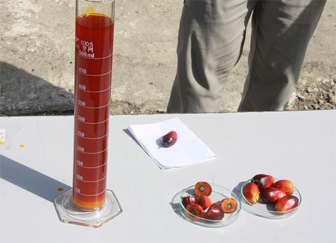Europe cuts biofuel targets to 4% in 2015, 6% in 2020
Europe cuts biofuel targets to 4% in 2015, 6% in 2020
mongabay.com
September 12, 2008
The European Union significantly reduces targets for biofuels produced from food sources, while boosting goals for other renewables
The E.U. voted to relax biofuels targets following widespread criticism of their social, economic, and environmental impacts.
Thursday the European Parliament’s Industry and Energy Committee said it would push a plan calling for a 5 percent share of renewables in transport fuel by 2015 and a 10 percent target by 2020, a reduction from the 20 percent target set forth in March 2007. The plan effectively cuts targets for biofuels produced from conventional feedstocks to four percent in 2015 and six percent in 2020. The remainder of the goal would come from renewable electricity and hydrogen (solar, wind, tidal, geothermal) as well as energy feedstocks that do not compete with food production (potentially cellulosic ethanol). Critics say that the rush to produce ethanol and biodiesel from grains and oilseeds has caused food prices to surge worldwide.

|
The new plan includes social sustainability criteria, including respect for the land rights of local communities and fair remuneration for workers, as well as environmental standards, including offering at least 45 percent carbon emission savings compared to conventional fossil fuels, a figure that would rise to 60 percent in 2015. The plan would seem to address some of the criticism raised by environmentalists and human rights groups who say that biofuels are triggering displacement of local people and driving the conversion of important ecosystems, including peatlands and rainforests in the Amazon and Southeast Asia.
The 2020 target will be up for review again in 2014.
Related
Biofuels 200 times more expensive than forest conservation for global warming mitigation
(8/27/2008) The British government should end subsidies for biofuels and instead use the funds to slow destruction of rainforests and tropical peatlands argues a new report issued by a U.K.-based think tank. The study, titled “The Root of the Matter” and published by Policy Exchange, says that “avoided deforestation” would be a more cost-effective way to address climate change, since land use change generates more emissions than the entire global transport sector and offers ancillary benefits including important ecosystem services.
Biofuels can reduce emissions, but not when grown in place of rainforests
(7/22/2008) Biofuels meant to help alleviate greenhouse gas emissions may be in fact contributing to climate change when grown on converted tropical forest lands, warns a comprehensive study published earlier this month in the journal Environmental Research Letters. Analyzing the carbon debt for biofuel crops grown in ecosystems around the world, Holly Gibbs and colleagues report that “while expansion of biofuels into productive tropical ecosystems will always lead to net carbon emissions for decades to centuries… [expansion] into degraded or already cultivated land will provide almost immediate carbon savings.” The results suggest that under the right conditions, biofuels could be part of the effort to reduce humanity’s carbon footprint.
Beyond high food prices, little to show for $11B/yr in biofuel support, says OECD report
(7/17/2008) Government support of biofuel production in rich countries is squandering vast amounts of amounts of money while exacerbating the global food crisis and failing to meaningfully curb greenhouse gas emissions and improve energy security, alleges a new report from the OECD, the club of industrialized nations.
Biofuels, food demand may doom tropical forests
(7/14/2008) Rising demand for fuel, food, and wood products will take a heavy toll on tropical forests, warns a new report released by the Rights and Resources Initiative (RRI).
Palm oil industry moves into the Amazon rainforest
(7/9/2008) Malaysia’s Land Development Authority FELDA has announced plans to immediately establish 100,000 hectares (250,000) of oil palm plantations in the Brazilian Amazon. The agency will partner with Braspalma, a local company, to form Felda Global Ventures Brazil Sdn Bhd. FELDA will have a 70 percent stake in the venture. The announcement had been expected. Last month Najib said Malaysia would seek to expand its booming palm oil industry overseas. The country is facing land constraints at home.
Britain urges ‘cautious approach’ on biofuels
(7/7/2008) Britain and the E.U. should exercise caution in pushing for wider use of biofuels, warns a new study commissioned by the U.K. government.








